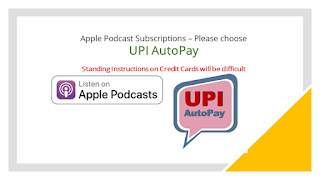The Reserve Bank of India (RBI) informed to the public at large that, by order dated April 23, 2021, it has imposed restrictions on American Express Banking Corp. and Diners Club International Ltd. from on-boarding new domestic customers onto their card networks from May 1, 2021.
This action was necessary
as these entities have been found non-compliant with the RBI directions on
Storage of Payment System Data.
Reserve Bank of India has
clarified that the order will not impact existing customers. The order only
restricts onboarding new customers
American Express Banking
Corp. and Diners Club International Ltd. are Payment System Operators
authorized to operate Card Networks in the country under the Payment and
Settlement Systems Act, 2007 (PSS Act).
The following are the
present AmEx Card Variants, available in India:
·
American Express Platinum Card
·
American Express Smart Earn
·
American Express Membership Rewards
·
American Express Platinum Reserve
·
American Express Gold Card
·
American Express Platinum Card
·
Jet Airways American Express Platinum
AmEx card volumes for the
last few months are us under: -
Diners Club operates as a
co-branded card with HDFC Bank hence independent card statistics are not in
public domain
The following are Diner
Club Card Variants, available in India :
·
Diners Club Black
·
Diners Club Privilege
·
Diners ClubMiles
·
Diners Club Premium
·
Diners Club Rewardz
Each card variant has
different privileges.
QUOTE
1950
DINERS CLUB BECOMES THE
WORLD’S FIRST MULTIPURPOSE CHARGE CARD
For businessman Frank
McNamara, forgetting his wallet while dining out at a New York City restaurant
was an embarrassment he resolved never to face again. Luckily, his wife bailed
him out and paid the tab.
A year later in February
1950, he returned to Major’s Cabin Grill with his partner Ralph Schneider. When
the bill arrived, McNamara paid with a small cardboard card, known today as a
Diners Club Card. The event was hailed as the First Supper, paving the way for
the world’s first multipurpose charge card.
UNQUOTE
Background for RBI Press
Release dt 23rd April, 2021.
RBI takes supervisory
action on Card Networks – American Express Banking Corp. and Diners Club
International Ltd
In terms of RBI circular
on Storage of Payment System Data dated April 6, 2018, all Payment System
Providers were directed to ensure that within a period of six months the entire
data (full end-to-end transaction details / information collected / carried /
processed as part of the message / payment instruction) relating to payment
systems operated by them is stored in a system only in India.
They were also required to
report compliance to RBI and submit a Board-approved System Audit Report (SAR)
conducted by a CERT-In empanelled auditor within the timelines specified
therein.
Disclaimer: These are my
personal views only. The bottom line is Mission #LessCashNotCashLess
Good to read: -
Our card members come from
all walks of life: Manoj Adlakha, American
Express





